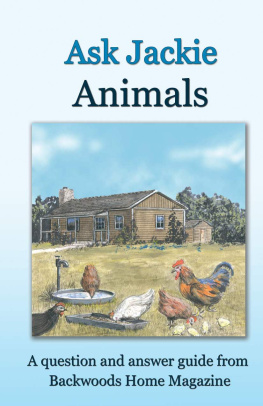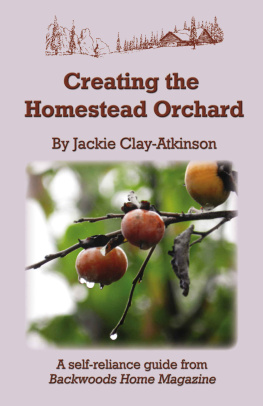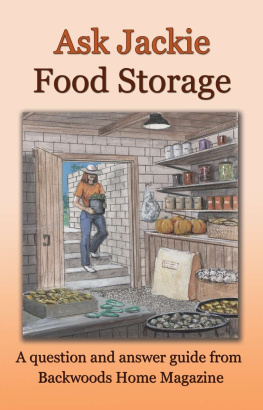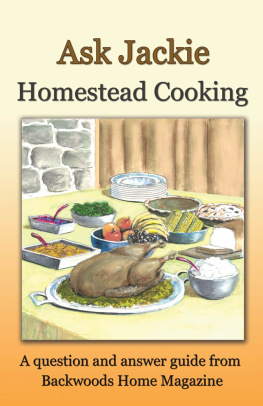Jackie Clay-Atkinson - Ask Jackie: Animals
Here you can read online Jackie Clay-Atkinson - Ask Jackie: Animals full text of the book (entire story) in english for free. Download pdf and epub, get meaning, cover and reviews about this ebook. year: 2012, publisher: Backwoods Home Magazine, genre: Detective and thriller. Description of the work, (preface) as well as reviews are available. Best literature library LitArk.com created for fans of good reading and offers a wide selection of genres:
Romance novel
Science fiction
Adventure
Detective
Science
History
Home and family
Prose
Art
Politics
Computer
Non-fiction
Religion
Business
Children
Humor
Choose a favorite category and find really read worthwhile books. Enjoy immersion in the world of imagination, feel the emotions of the characters or learn something new for yourself, make an fascinating discovery.
- Book:Ask Jackie: Animals
- Author:
- Publisher:Backwoods Home Magazine
- Genre:
- Year:2012
- Rating:3 / 5
- Favourites:Add to favourites
- Your mark:
- 60
- 1
- 2
- 3
- 4
- 5
Ask Jackie: Animals: summary, description and annotation
We offer to read an annotation, description, summary or preface (depends on what the author of the book "Ask Jackie: Animals" wrote himself). If you haven't found the necessary information about the book — write in the comments, we will try to find it.
Ask Jackie: Animals — read online for free the complete book (whole text) full work
Below is the text of the book, divided by pages. System saving the place of the last page read, allows you to conveniently read the book "Ask Jackie: Animals" online for free, without having to search again every time where you left off. Put a bookmark, and you can go to the page where you finished reading at any time.
Font size:
Interval:
Bookmark:
Table of Contents
Ask Jackie
Animals
Copyright 1999-2012
ISBN: 978-0-9860152-0-5
Backwoods Home Magazine
PO Box 712
Gold Beach, Oregon 97444
www.backwoodshome.com

Edited by Jessie Denning, Julia Denning, Haley Kessel, Connie Sayler, Lisa Nourse, Rhoda Denning, and Ilene Duffy
Cover art by Don Childers
Illustrations by Don Childers, Jessie Denning, and John Dean
Introduction
Nearly every homestead will have at least some critters, be they chickens, rabbits, or a dairy goat or two. The amount of land a family has determines, to a great extent, the variety and number of these animals. For instance, a homesteading family on an acre of land can seldom spare the room to house a dairy cow and her calf. But they sure have room for a flock of chickens, a small rabbitry, and a couple of milk goats.
These animals contribute greatly to the self-reliant homestead. Chickens and other poultry provide eggs, meat, and valuable manure for the garden. They are easy to house and handle. Besides, they are fun to watch and interact with!
Rabbits are quiet, gentle, and easily handled by even the most timid homesteader and their children. They also provide tasty meat and valuable manure.
Dairy goats require a little more forethought as they have greater requirements such as: sturdy fencing, a modest shelter, and a milking stand for ease of milking. In exchange, they give you not only milk but also cheese, cottage cheese, yogurt, and ice cream. An added bonus is meat from castrated male kids or cash from the sale of wether or doe kids. Your garden will also love goats, as their manure is excellent organic fertilizer.
Nearly any homestead can raise a pig or two to butcher. A butcher hog requires little space. A couple hundred square feet, well managed, can corral a pig, and a simple shelter is all a hog requires. In as little as six months time a weaned pig will weigh about 250-285 pounds and be ready to butcher. This is about the fastest weight gain of any meat animal.
Of course, if you have a larger acreage you can easily raise a bottle calf to butchering size. But it will take the calf nearly two years time as well as adequate pasture, hay, and grain to reach 1,000 pounds. In the end though, youll have a great deal (about 700 pounds!) of the best-tasting beef imaginable.
Both the butcher pig and steer also will give you plenty of manure to add to your gardens compost pile. Its a totally win-win situation.
In this book, I answer a whole lot of common (and a few uncommon) questions folks have asked about a wide variety of homestead critters. Have fun reading and I hope I answer some of your own questions along the way.
Jackie Clay
Chickens

Inbreeding chickens
How long can you keep the same rooster without your flock becoming inbred? Or are there any inbreeding problems with chickens?
Heather Adams, Oregon
It depends on whether or not you are saving chicks to use as adult layers. If you do, its a good idea to trade roosters with a friend every three years or so. While inbreeding is not a huge issue with a home flock, too much inbreeding can result in some congenital problems. If you arent letting hens go broody and hatch eggs, the same rooster can be kept for years and years.
In fact, a rooster is not necessary at all unless you do plan on having fertile eggs to hatch or use. A lot of urban chicken owners have a small flock of hens for home use, but dont keep a rooster so their neighbors wont complain of the early morning crowing.
Broody chicken
I have a chicken who is one broody girl. Just fine with me as we still have some time left this season for some new chicks.
My question is may I move her from the coop with all her eggs or should I move her over without her eggs and just put some in here and there on top of the new ones she lays? I have several that can go under her right now and would sure love her help. She doesnt let me get near the ones she is sitting on at night, so I was hoping to move her and her eggs over to a safe place out of the main coop. Would this work? Will she still sit on them?
Christine Wasankari, Washington
Yes, shell still sit on them.
The easiest way to set a broody hen is to move her and her eggs (or the eggs you wish her to set on) into an enclosed box at night. Cover the box for a couple of days, then remove the cover; she should be set tight. Be sure to have food and water available to her. The best way Ive found is to make a small chicken tractor with a nest box she can be locked in at first. After shes set tight, open the door and let her have free range to go out and eat and drink as she needs to. Then when the chicks hatch, they have a protected environment to grow in.
Cannibalistic chickens
We are having problems in the chicken coop with beak pecking kind of cannibalistic. I think I remember hearing that you could trim chicken beaks to help prevent this. Do you know what this entails and how to safely do this? Or any other suggestions? The chickens havent been out of the pen for several weeks now with the severe weather here in northern Minnesota this winter maybe they are bored cooped up!
Debra Brown, Minnesota
You can trim the upper beak of chickens to reduce cannibalism, but this is quite severe. It is done with a cauterizing cutter, as you trim back to where there is blood supply; without the cauterization, it would bleed. I would remove any chickens with any bloody pecked areas. Then let the chickens outside, even for a few hours in the afternoon. Its amazing what this will do for them; they peck snow, flap around, and enjoy themselves, totally forgetting boredom and pecking. Giving them something special to peck on also helps: a squash, cabbage, head of lettuce, trimmings from the store (free). Soon the weather will turn nice again and they can be out all day, as they wish. And the pecking usually stops. Reintroduce the pecked chickens after they have healed, putting them in at night so the others dont notice the newbie.
Chickens picking at each other
I know chickens are omnivores, but why do they pick at each other is something lacking in their diet?
Donald Allen, Texas
Chickens develop this habit, usually, from boredom. Be sure they can get outside daily, even in bad weather. Also give them plenty of room both inside and out. Giving them such things as soaked alfalfa leaves or rabbit pellets, fresh greens, and also scattering some grain outside so they can dig and scratch will also help prevent this problem. Remove any chicken that has a spot picked so bad that it is bleeding; chickens will pick such a bird so badly that it will eventually die. Once the bird is healed, it is okay to put it back into the coop.
Rooster acting strange
I have a hen and a rooster (supposed to be two hens HAH!) and when I approach the rooster he has taken to squatting down with his head down until I pet him, as if he is showing me obeisance! This is disturbing to me and I wonder if I can release him from the need. The hen doesnt do it. Can you explain this to me? They are Buff Orpingtons and even the rooster is sweet.
Alice Hood, Arizona
He just sees you as the dominant rooster. Im thinking that when he gets older, hell probably re-think that and become a normal rooster. Its nothing to worry about; he should outgrow it.
How long will hens be productive?
How long can I keep chickens in order that they be productive for eggs? How many years are they good for laying eggs? Does it depend on the type of chickens? Some are better layers than others. Mine are mainly Ameraucanas.
Next pageFont size:
Interval:
Bookmark:
Similar books «Ask Jackie: Animals»
Look at similar books to Ask Jackie: Animals. We have selected literature similar in name and meaning in the hope of providing readers with more options to find new, interesting, not yet read works.
Discussion, reviews of the book Ask Jackie: Animals and just readers' own opinions. Leave your comments, write what you think about the work, its meaning or the main characters. Specify what exactly you liked and what you didn't like, and why you think so.













